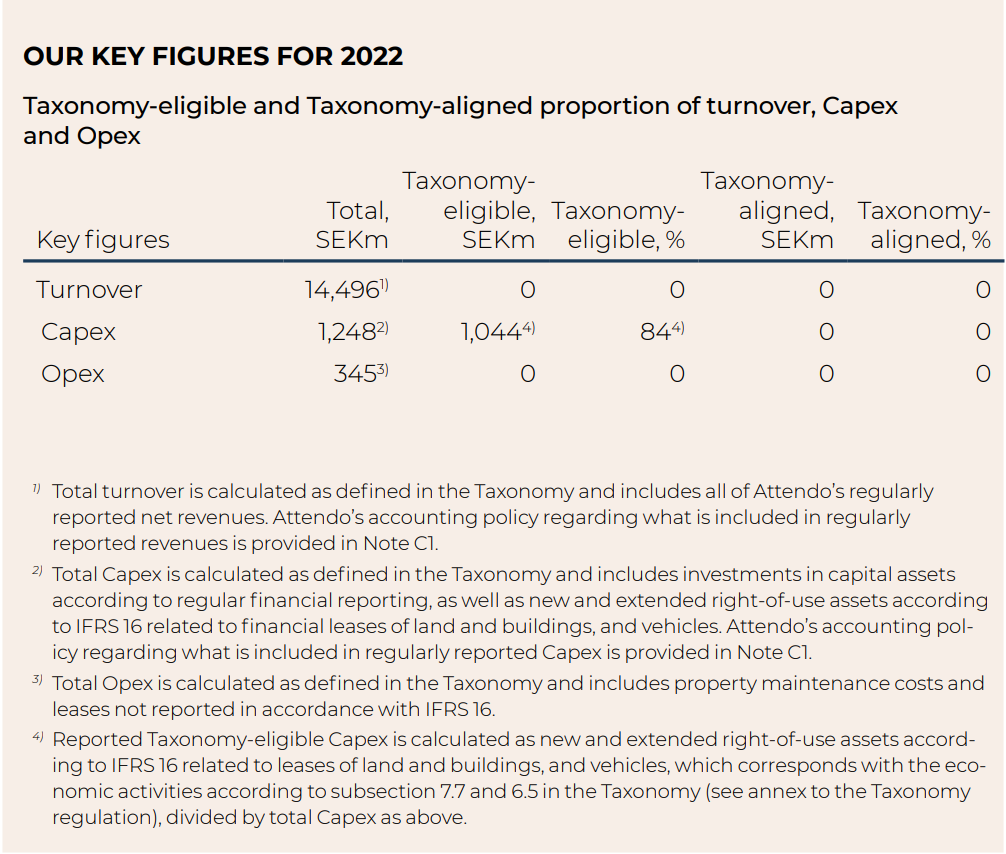Attendo & the EU Taxonomy for sustainable activities
As a large, listed company with many employees, Attendo is covered by the disclosure requirements under the EU Taxonomy for Sustainable Activities. A description of Attendo’s activities and summary disclosures according to the Taxonomy follows below.
Overview of Attendo's activities in the light of the EU Taxonomy
Attendo’s activities include care for older people, care for people with disabilities and care for individuals and relatives. We have evaluated each of these parts of our operations in the light of environmental objective 1 (Climate change mitigation) and environmental objective 2 (Climate change adaptation).
The economic activities that are covered by objectives 1 and 2 are such that have been identified as most relevant for reductions of greenhouse gas emissions and improving climate resilience. This includes sectors with the
highest contribution to CO2 emissions (energy, manufacturing, transport and
buildings) and activities enabling their transformation because the transformation of activities in these sectors has been deemed necessary to reach the EU’s climate objectives.
Attendo’s activities are not covered by the activities that are relevant for
objective 1. Based on this, it can be concluded that social care activities have not been identified as a major source of greenhouse gas emissions.
Attendo’s activities are covered by the activities that are relevant for objective 2. The regulations are applicable to “Residential care activities” (subsection 12.1), which covers the majority of Attendo’s care activities. Care
activities are covered by the objective regarding climate change adaptation
because “production facilities”, that is, the buildings in which care is provided,
are regarded as a material component of producing care. Attendo’s business
model is based on leasing the buildings in which it operates. This means that
Attendo does not have full control over these properties. However, working
closely with property developers and property owners is one of our top priorities. Through close partnership and clear and specific requirements related to sustainability, Attendo can contribute to increasing the number of buildings that meet sustainability criteria.
Attendo’s turnover is generated through its care activities. Through
these care activities, we are also part of a value chain that includes our investments and expenditures in several sectors. Our investments and capital
expenditures are related primarily to entering into long-term leases. Personnel costs are our most significant operational expenditures, but these are not included in the Taxonomy’s definition of operational expenditures.
Based on the above and in the light of EU’s environmental objectives related to climate change, one of Attendo’s most important contributions to sustainable development is to impose demands while working closely with property owners and other suppliers. Attendo aims to intensify these efforts in 2023 and to further develop reporting in this
regard.

Comments on the key figures
Turnover
Attendo does not report any Taxonomyeligible turnover. The reasons for this are that Attendo’s activities are not covered by environmental objective 1 and that the current interpretation of the key figure does not provide scope for including turnover from care activities. Attendo will, however, regularly reassess this interpretation.
Capital Expenditure, CAPEX
Attendo reports certain capital expenditures as eligible based on the assessment that they are “purchases of outputs from Taxonomy-eligible activities”, a type of capital expenditure that must be reported according to the Taxonomy.
The proportion of these expenditures aligned with the defined sustainability
criteria according to the Taxonomy is 0 for 2022. This is not because they are
unsustainable to various degrees, but rather because the suppliers’ current
processes, methods and level of documentation have not been assessed as a
sufficient basis for conclusions about alignment with the defined sustainability criteria. Further developing these processes and thus the quality of reporting is a key focus area in 2023.
Operational Expenditures, OPEX
Upon application of the Taxonomy definition, Attendo’s operational expenditures (Opex) include building maintenance and leases that are not expensed according to IFRS 16. Total Opex not material to Attendo’s business model because they comprise such a small fraction of regular operating expenditures respective to Attendo’s activities and are therefore exempt from reporting in accordance with the Taxonomy’s exemption for non-material operational expenditures.
